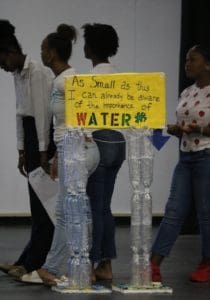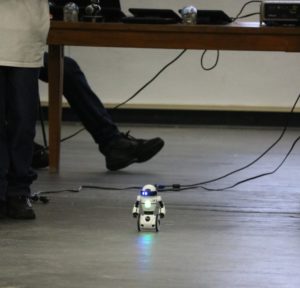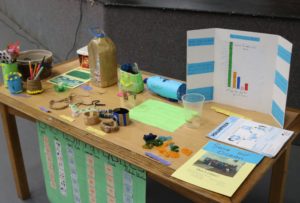
More than 100 students enrolled in the St. Croix District’s Summer STEM Research Academy explored the topics of plastics, python mathematics, water contamination, mulching, robotics and coding over the last four weeks.
The program held its culminating activity on Thursday, Aug. 1, at the St. Croix Educational Complex High School auditorium, where groups of junior and senior high school students presented the findings of their projects.
St. Croix District Science and STEM Coordinator Rosa White congratulated students and teachers for their hard work.
“Students have done great things this summer,” she said. “Teachers, job well done. You have done an exceptional job, as you always do for the STEM program.”

A display constructed by the program’s junior high students showcased ways to recycle and reuse plastic, as well as the chemistry of the synthetic material. The students also gave a musical performance on littering, highlighting that plastic is the largest category of debris found in the Caribbean.
“Students learned the importance of reducing the use of plastics,” said STEM teacher Basil Williams Jr., who teaches mathematics at Elena Christian Jr. High School. “They learned how plastics are affecting marine life and were surprised to learn that by the year 2050, scientists predict there will [be] more plastic in the sea than fish.”
Williams went on to explain how he used math to help students understand the impact of plastics on the environment.
“The math they learned and practiced help them to understand the coding used in the program they built to calculate how many plastic bottles on average we dispose of annually in the Virgin Islands,” he said.

Following the musical presentation, the junior high students gave a Power Point presentation on a computer program called Python and mathematics. They demonstrated a robot, which is controlled by Python coding, and explained how the math problems estimate plastic waste.
High school students participating in the Summer STEM Research Academy constructed three displays. One group showcased research on water contamination and conservation, which included samples of water along with items students created from bottle caps and water bottles.
The “Aquastars,” as they were named, explained why they chose to study water.
“We all know we went through two Category 5 hurricanes. So, during the summer we wanted to see if this changed the quality of our water,” said student Nancy Parilla.
As part of their research, the students tested water at local schools, bottled water and cistern water for its PH, nitrate, phosphate, turbidity, dissolved oxygen and coliform. Some results surprised students, indicating the importance of the Summer STEM program.

Another group of high-schoolers created two 3-D displays depicting the before and after of mulching. A third group, whose focus was to create virtual reality tours, displayed goggles constructed from cardboard boxes used as part of a virtual reality headset. Students and their parents in the technology group tested the goggles, pairing them with their cellphones to experience a virtual reality tour.
Department of Education Mathematics Coordinator Juanita Boneque and Science Coordinator Rosa White manage the Summer STEM Research Academy.
The academy is designed to motivate junior and senior high school students to pursue careers in science, technology, engineering and mathematics.





